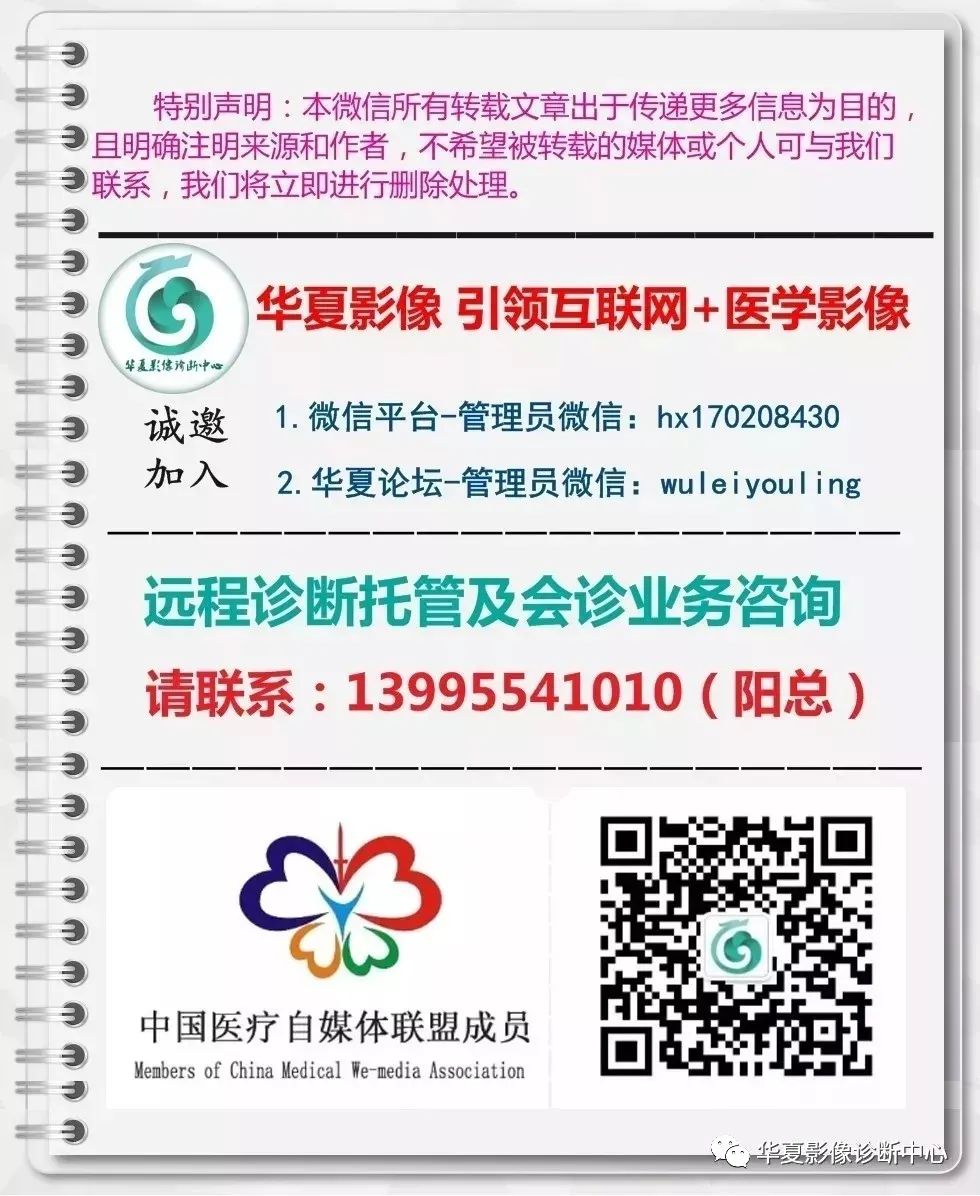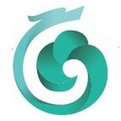
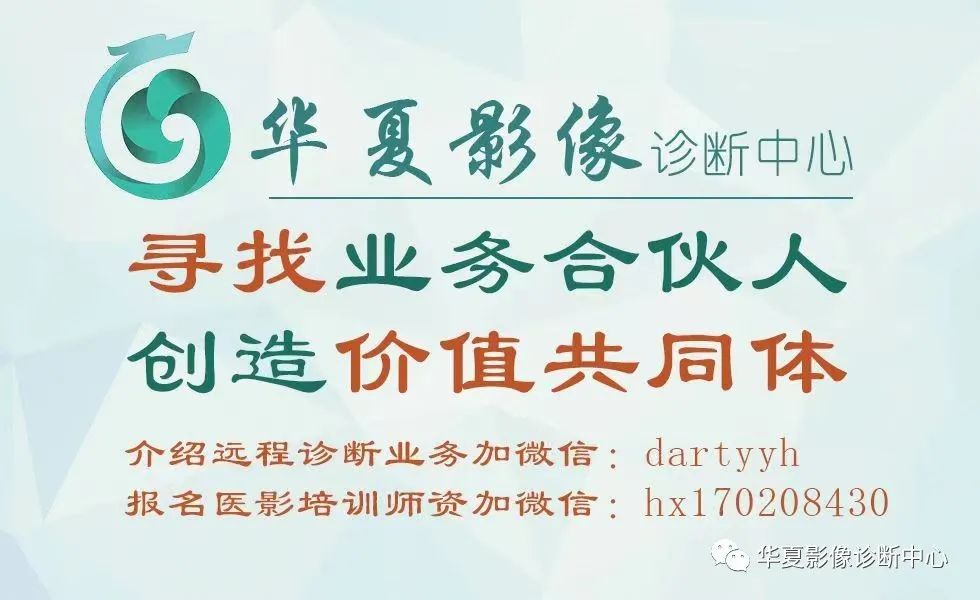
Individuals who frequently experience symptoms of Qi deficiency, typically manifesting as fatigue, shortness of breath, low voice, reduced appetite, and loose stools, may benefit from the health-promoting properties of the traditional Chinese herb Huang Qi (Astragalus).
Huang Qi, historically known as Huang Qi, derives its name from the term “Qi,” which means elder, and has been referred to by Li Shizhen as the “king of tonics.” Its yellow color corresponds to its affinity for the spleen, and it has been regarded as an excellent remedy for tonifying the spleen and Qi since ancient times.
Effects of Huang Qi
Huang Qi is sweet and warm, entering the spleen and lung meridians. It has the following effects: tonifying Qi and strengthening the spleen, lifting Yang and preventing prolapse, benefiting the Wei Qi and stabilizing the exterior, promoting diuresis and reducing swelling, and expelling toxins to promote tissue regeneration.
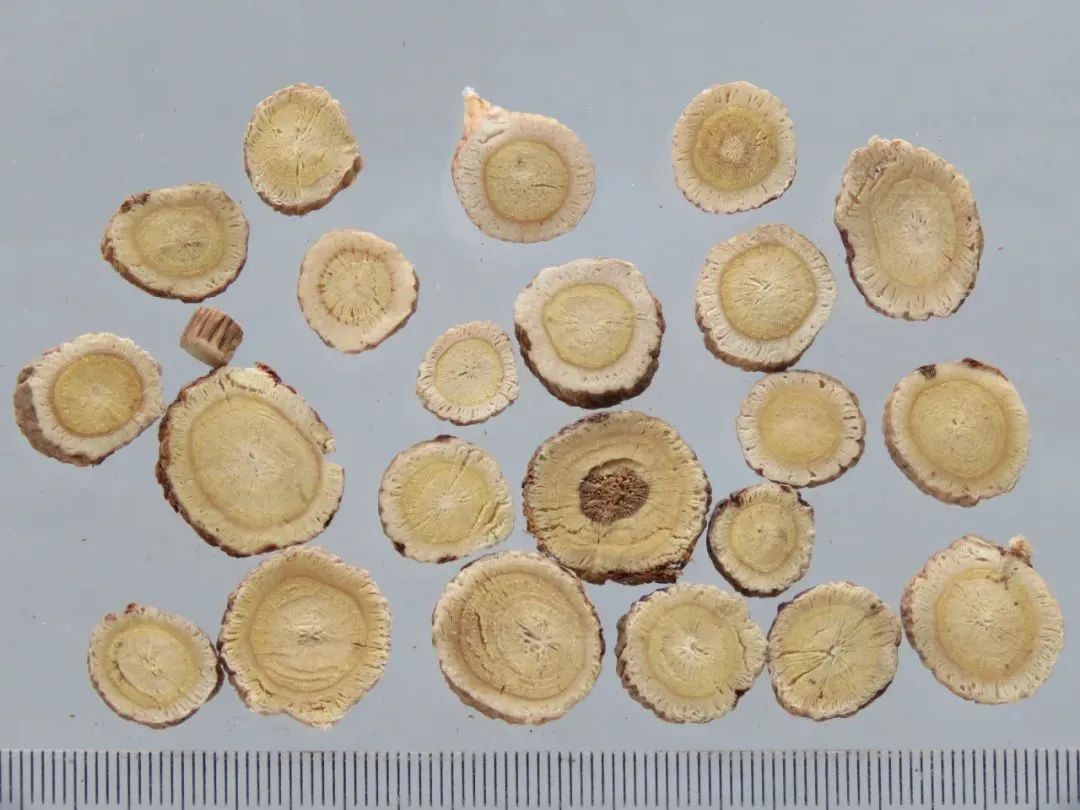
▲ Huang Qi slices
1. Tonifying the Middle and Benefiting Qi
Huang Qi not only strengthens the spleen and tonifies Qi but also nourishes the Qi of the five organs. When symptoms of Qi deficiency arise, Huang Qi can be used for regulation.
2. Lifting Yang and Preventing Prolapse
The spleen governs upward movement; if spleen Qi is insufficient, it may lead to prolapse of internal organs, such as uterine prolapse, excessive menstrual bleeding, and rectal prolapse. Huang Qi can replenish Qi, allowing spleen Qi to rise normally and prevent prolapse.
3. Tonifying Qi and Benefiting Wei
Wei Qi protects the body’s surface. Huang Qi not only tonifies internal Qi but also enhances external immunity, making it beneficial for those who frequently catch colds.
4. Promoting Diuresis and Reducing Swelling
The medical sage Zhang Zhongjing mentioned in his work Jin Gui Yao Lue the use of Huang Qi to treat rheumatic edema, particularly effective for edema caused by Qi deficiency.
5. Expelling Toxins and Promoting Tissue Regeneration
If the body is deficient in Qi and blood, leading to non-healing sores or slow recovery from surgery, Huang Qi can be very effective.
Modern research has confirmed that Huang Qi has cardiotonic, vasodilatory, antihypertensive effects, enhances immunity, promotes protein synthesis, and reduces proteinuria.
Huang Qi functions to tonify Qi and strengthen the body, and it is widely used in traditional pills, powders, and pastes:
Huang Qi Liu Yi Decoction: 6 parts Huang Qi, 1 part Gan Cao (Licorice), used to treat men and women with Qi deficiency and blood weakness, fatigue, chest discomfort, frequent thirst, dry lips, pale complexion, loss of appetite, or those who sweat easily due to Wei Qi deficiency.
Tai Ping Sheng Hui Fang: 50 grams Huang Qi, 75 grams Shu Di Huang (Rehmannia), 100 grams japonica rice, and one chicken intestine, cooked into porridge or soup, used to treat bladder coldness and frequent urination.
Experience Secret Formula: 30 grams Huang Qi and 150 grams glutinous rice, cooked into porridge to treat excessive menstrual bleeding.
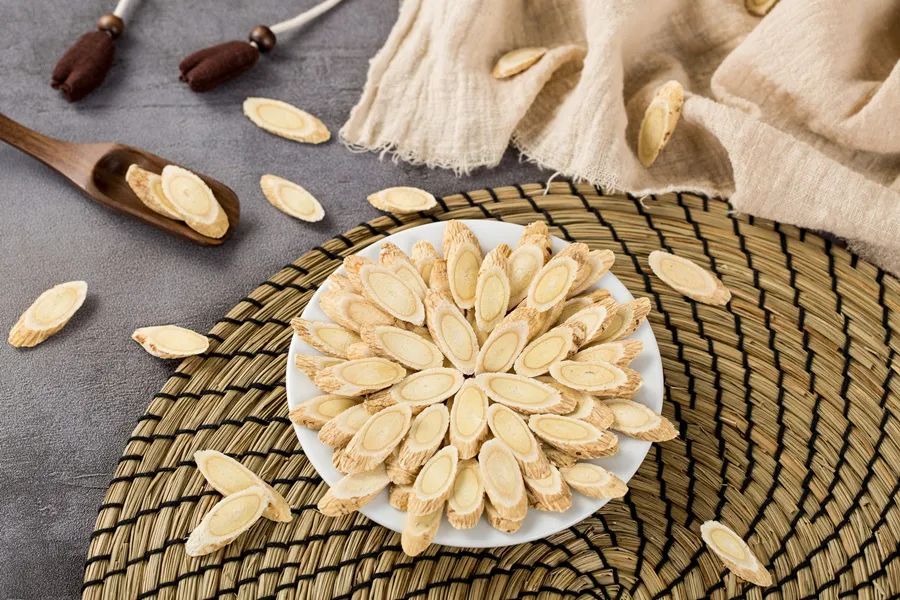
Who Should Use Huang Qi?
1. Individuals with Qi Deficiency
Many elderly individuals experience asthma due to Qi deficiency, becoming short of breath with minimal exertion (heart Qi deficiency);
Those with reduced appetite, abdominal distension, fatigue, and loose stools (spleen and stomach Qi deficiency);
Individuals who are timid and avoid speaking in public (liver Qi deficiency);
Those with kidney prolapse (kidney Qi deficiency).
2. Individuals with Spontaneous Sweating
Spontaneous sweating occurs with minimal activity, leading to feelings of weakness and fatigue. This is often due to exterior deficiency and spontaneous sweating, indicating Qi deficiency and insufficient Wei Qi to contain sweat. Huang Qi can effectively tonify Qi to stabilize sweat.
3. Individuals with Edema
Diuretic treatments for chronic edema often address symptoms rather than the root cause, as chronic edema is not due to excess water but rather an inability to utilize water effectively due to insufficient Qi. Huang Qi can tonify lung, spleen, and kidney Qi, promoting fluid metabolism.
4. Individuals with Constipation
Constipation can manifest in various forms; Huang Qi is effective for Qi deficiency constipation, where there is a sense of urgency but difficulty in passing stool, resulting in thin, noodle-like stools, often accompanied by sweating and shortness of breath after defecation.
Four Situations to Avoid Using Huang Qi
While Huang Qi is beneficial, it should be used with caution in the following situations:
1. Avoid during Heat Conditions:Huang Qi has nourishing properties, but if one experiences symptoms of heat such as hoarseness or sore throat, it is best to avoid Huang Qi water, as it may exacerbate the condition.
2. Limit Use in Hot Weather:Consuming Huang Qi in hot weather may lead to heat symptoms such as nosebleeds. It is advisable to consume Huang Qi water in cooler seasons, such as autumn and winter, for better effects.
3. Avoid Before Sleep:Generally, it is not recommended to consume Huang Qi water before bedtime. Huang Qi contains components that dilate blood vessels and promote circulation, which may affect sleep quality and increase nighttime urination.
4. Caution for Individuals with High Blood Pressure:Scientific studies indicate that Huang Qi has a bidirectional effect on blood pressure; light use (below 15 grams) may raise blood pressure, while heavy use (above 30 grams) may lower it. Regular doses of Huang Qi in tea may raise blood pressure, potentially worsening the condition.
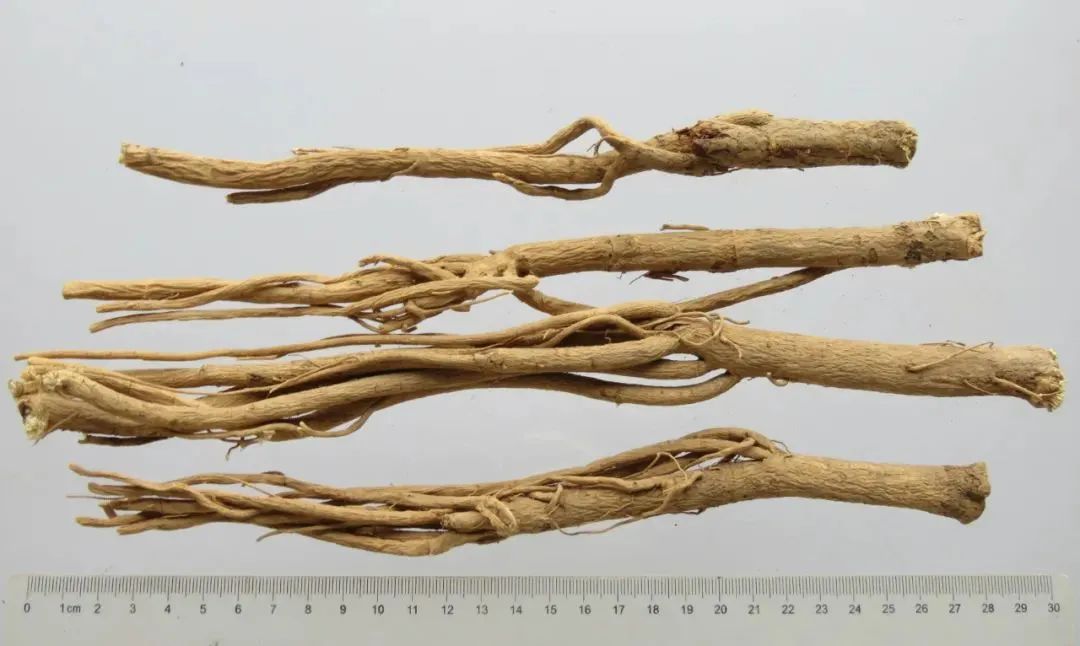
▲ Huang Qi herb
Additionally, it is important to identify one’s constitution before using traditional Chinese medicine. Generally, the following groups should avoid Huang Qi:
1. Individuals with Yin Deficiency:Common symptoms include heat in the palms and soles, dry mouth and throat, irritability, and poor sleep quality;
2. Individuals with Damp-Heat:Common symptoms include dry mouth, bitter taste, foul breath, strong body odor, and thick greasy tongue coating;
3. Individuals with Severe Heat Toxicity:Common symptoms include flushed face, local heat, high fever, dark yellow urine, dry stools, and yellow tongue coating;
4. Individuals with Active Colds or Fevers;
5. Women during Menstruation or Pregnancy.
How to Consume Huang Qi
1. Infusion
Huang Qi and Jujube Tea: 60 grams of Huang Qi and 30 grams of jujube, soak in water for 1 hour, then simmer for 30 minutes. Drink daily as a tea, and the jujubes can be eaten. This tea has the effects of tonifying Qi, lifting Yang, stabilizing the exterior, nourishing the spleen, and enriching the blood, suitable for those with deficiency, pale complexion, dizziness, fatigue, shortness of breath, and spontaneous sweating.
Huang Qi Green Tea: 20 grams of Huang Qi and 3 grams of green tea. Brew with boiling water and drink when the temperature is suitable; it can be steeped up to 5 times. This helps improve nasal allergies and frequent colds.
Huang Qi Qi-Benefiting Tea: 10 grams each of American ginseng, goji berries, and Huang Qi, boiled together for daily consumption. This tea nourishes Qi, nourishes Yin, clears heat, relieves fatigue, and enhances immunity, suitable for those who often stay up late.
2. Porridge and Soup
Qi-Benefiting Porridge: 20 grams of roasted Huang Qi, 10 grams of Dang Shen (Codonopsis), and 100 grams of japonica rice. Slice Huang Qi and Dang Shen, soak in water for 40 minutes, then simmer to extract the essence. Cook the rice, and when nearly done, add the essence of Huang Qi and Dang Shen, simmer briefly, and add sugar to taste.
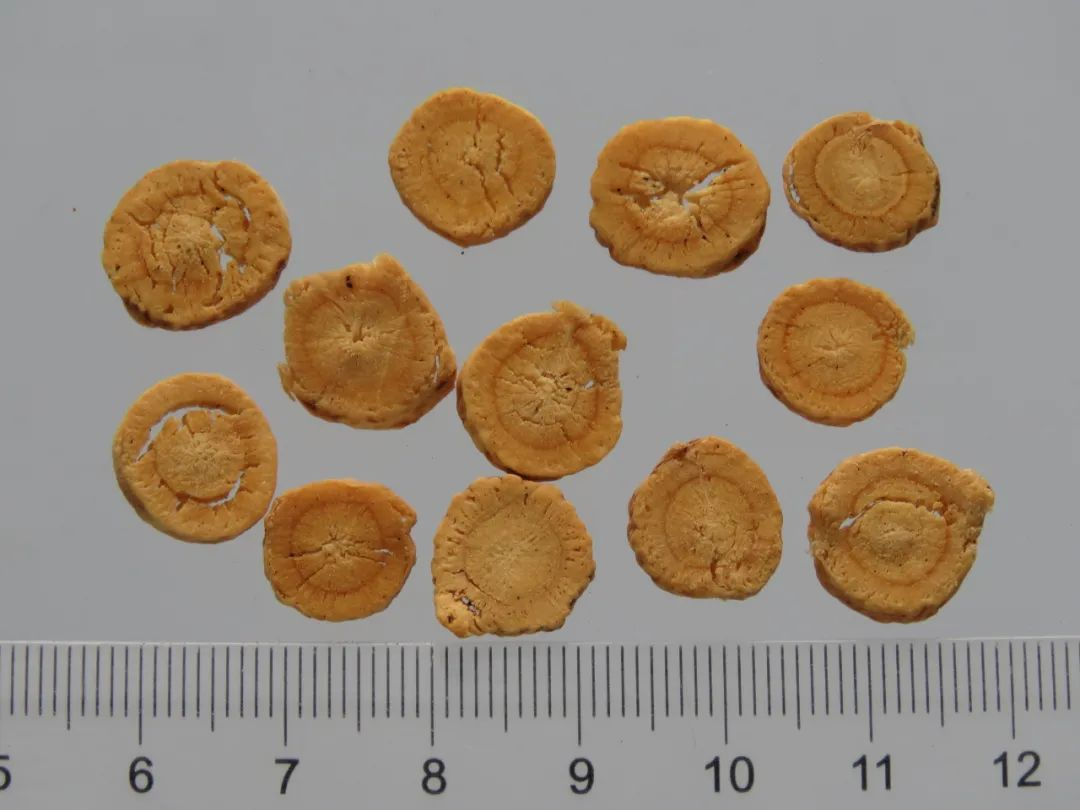
▲ Roasted Huang Qi
This recipe is from Sheng Ji Zong Lu, designed to tonify Qi, treat deficiency, and combat aging, suitable for those with internal injuries, fatigue, elderly individuals, chronic illness, palpitations, shortness of breath, spontaneous sweating, spleen deficiency, chronic diarrhea, and poor appetite.
Golden Silver Porridge: 50 grams of rice, 50 grams of millet, and 30 grams of Huang Qi. Wrap Huang Qi in gauze, tie it, soak with rice and millet for 30 minutes, then boil for 30 minutes. Remove the Huang Qi bag before serving. This porridge can improve digestive issues.
Egg and Yam Huang Qi Soup: 1 fresh egg, 100 grams of crisp yam, and 20 grams of Huang Qi. Slice the yam, wrap Huang Qi in gauze, and boil in water. When boiling, stir in the beaten egg, add a pinch of salt, and thicken with a little starch before serving. This soup can alleviate fatigue and loose stools.
3. Cooking
Eggplant Rolls: Slice eggplant into strips, dry in a pan; season ground beef to taste and mix with Huang Qi powder; spread the beef mixture on the eggplant, roll up, secure with toothpicks, and dust with cornstarch. Fry the rolls in oil, adding a sauce made from soy sauce, vinegar, salt, sugar, and pepper towards the end.
Huang Qi Steamed Chicken: One whole chicken, 30 grams of Huang Qi, salt, cooking wine, green onions, and ginger to taste. Clean the chicken, blanch in boiling water for 3 minutes, rinse with cold water, and drain. Soak Huang Qi in water for half an hour, then place inside the chicken. Steam the chicken with green onions, ginger, cooking wine, and salt for 2 hours. Remove the green onions and ginger, and serve the chicken with the Huang Qi on top, seasoned with pepper.
This medicinal dish is recorded in Sui Yuan Shi Dan, known for its ability to tonify Qi, lift Yang, nourish blood, and treat conditions such as spleen and stomach deficiency, fatigue, susceptibility to colds, blood deficiency dizziness, and prolapse due to Qi deficiency.
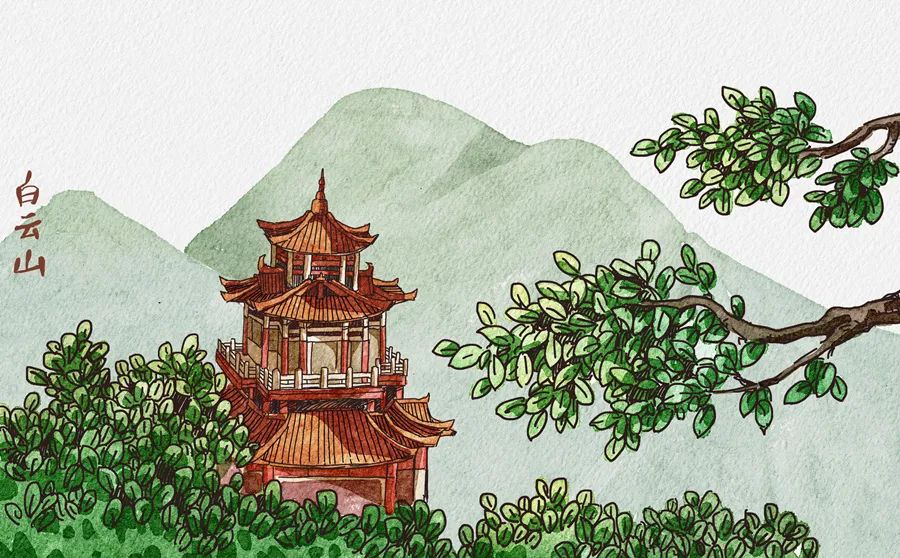
In addition, the practice of using medicinal ingredients in Guangdong cuisine is prevalent, with a famous dish being “Dang Shen Huang Qi Stewed Chicken,” made with half a hen, Huang Qi, Dang Shen, red dates, longan, and ginger, slow-cooked to perfection. Huang Qi is the key ingredient, providing a nourishing and sweet flavor, ideal for supplementation during cold winter months.
Huang Qi is widely used in Cantonese cuisine, not only in “Dang Shen Huang Qi Stewed Chicken” but also in “Bei Qi Carp Soup,” “Dang Gui Huang Qi Black Chicken Soup,” and “Huang Qi Dang Gui Lamb Soup.” These slow-cooked soups often feature Huang Qi as an ingredient due to its ability to tonify Qi, benefit Wei, and enhance immunity, making it particularly suitable for those with deficiencies.
Complementary Formulas with Huang Qi
1. Huang Qi + Goji Berries
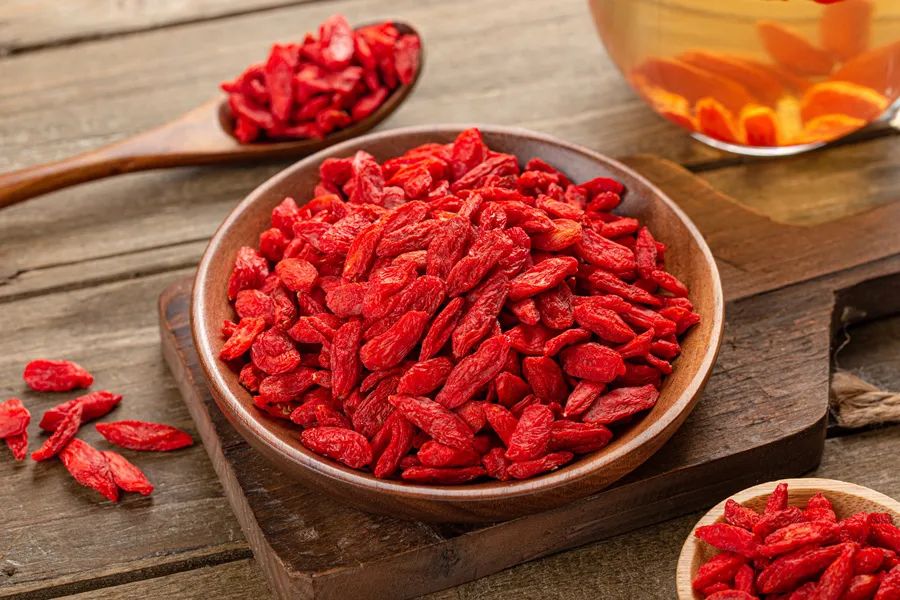
The Shen Nong Ben Cao Jing describes goji berries as “strengthening bones, promoting longevity, and resisting cold and heat.” The Ben Cao Hui Yan praises them for “nourishing Qi, replenishing blood, generating Yang, and promoting Yin.” Combining goji berries with Huang Qi yields excellent health benefits.
Effective Anti-Aging:Goji berries have adaptogenic properties similar to ginseng, and they can combat arteriosclerosis, lower blood sugar, and promote liver cell regeneration, enhancing physical vitality and delaying aging.
Improves Sleep Quality:Goji berries can be consumed year-round, and regular intake can improve physical constitution and alleviate sleep issues such as difficulty falling asleep.
Enhances Memory:Goji berries, known as “wisdom fruit,” when paired with Huang Qi, can improve memory and learning ability, making them suitable for students and working professionals.
2. Huang Qi + Dang Gui
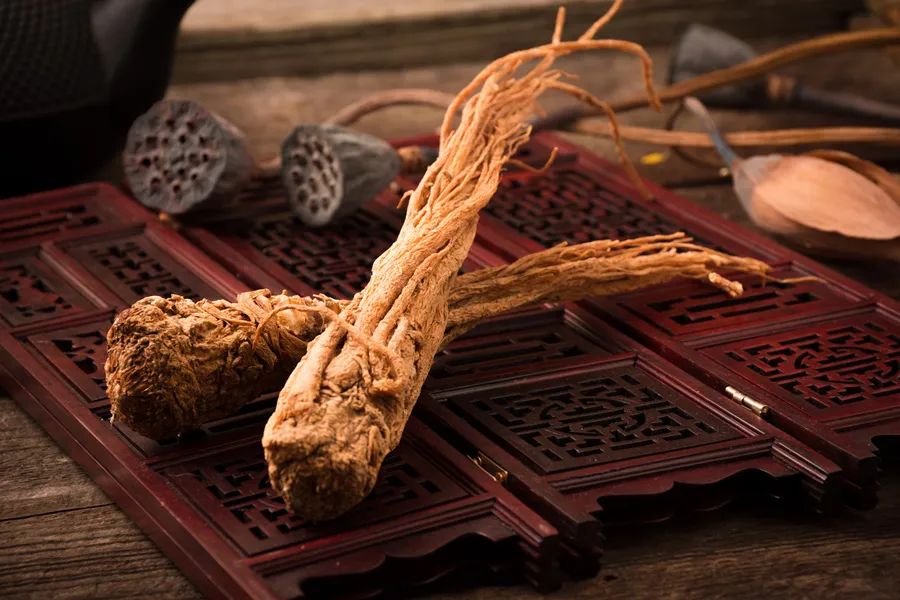
In traditional Chinese medicine, Dang Gui is sweet and warm, nourishing and moistening, primarily entering the liver, heart, and spleen meridians. It has excellent effects on nourishing blood, invigorating circulation, regulating menstruation, and relieving pain.
Regulates Menstruation and Relieves Pain:Many women experience irregular menstruation and dysmenorrhea; using Huang Qi with Dang Gui can eliminate gynecological inflammation, normalize menstruation, and reduce discomfort.
Prevents Arteriosclerosis:Dang Gui can effectively inhibit arteriosclerosis and promote the growth of red blood cells in the blood.
3. Huang Qi + Honeysuckle
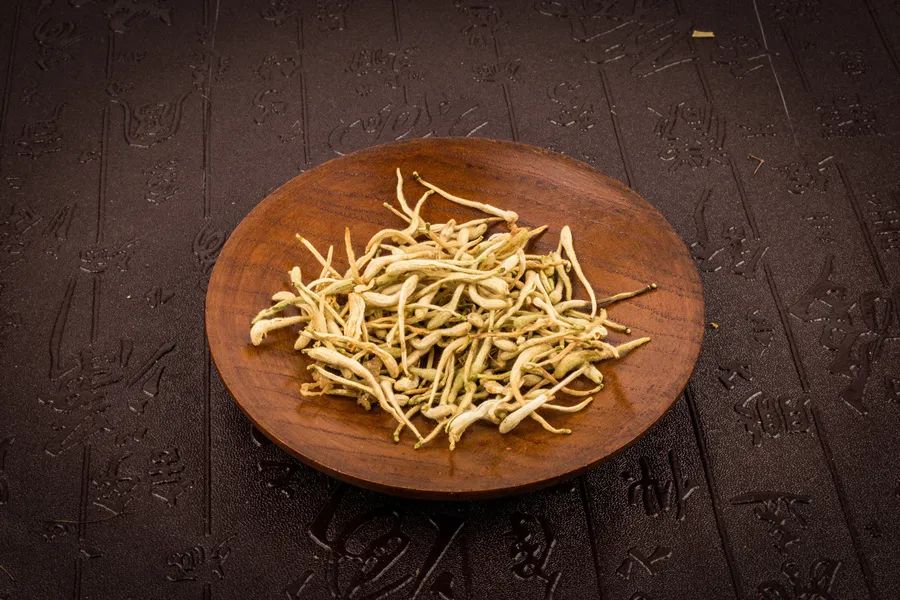
Honeysuckle is an excellent herb for clearing heat and detoxifying. It is sweet and cold, clearing heat without harming the stomach, and has aromatic properties that can dispel evils and eliminate dampness.
Regulates Chronic Kidney Disease:Huang Qi and honeysuckle are a perfect match for treating various kidney diseases.
Relieves Skin Itching:Regular consumption of honeysuckle tea can effectively alleviate skin itching.
4. Huang Qi + Dan Shen
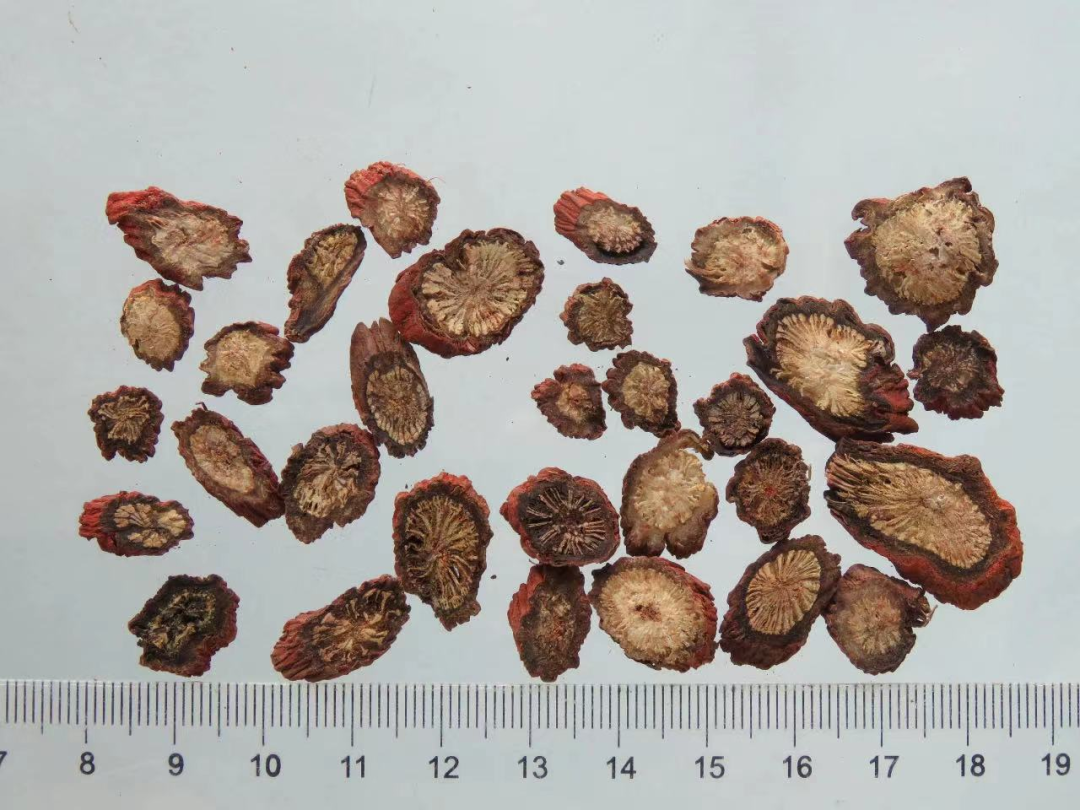
Traditional Chinese medicine believes that Dan Shen invigorates blood, while Huang Qi tonifies Qi, thus both have the effect of benefiting Qi and invigorating blood, useful for chest pain and heart issues caused by Qi deficiency and blood stasis. This combination can improve coronary blood supply for patients with coronary heart disease who often experience shortness of breath, fatigue, chest tightness, and spontaneous sweating.
Relieves Chest Pain and Palpitations:Young people often experience chest tightness and difficulty breathing due to work stress; consuming Huang Qi and Dan Shen soup can effectively alleviate these symptoms.
Prevents Thrombosis:Overweight individuals and the elderly are prone to thrombosis; drinking Dan Shen tea can promote blood circulation and reduce the formation of clots.
5. Huang Qi + American Ginseng
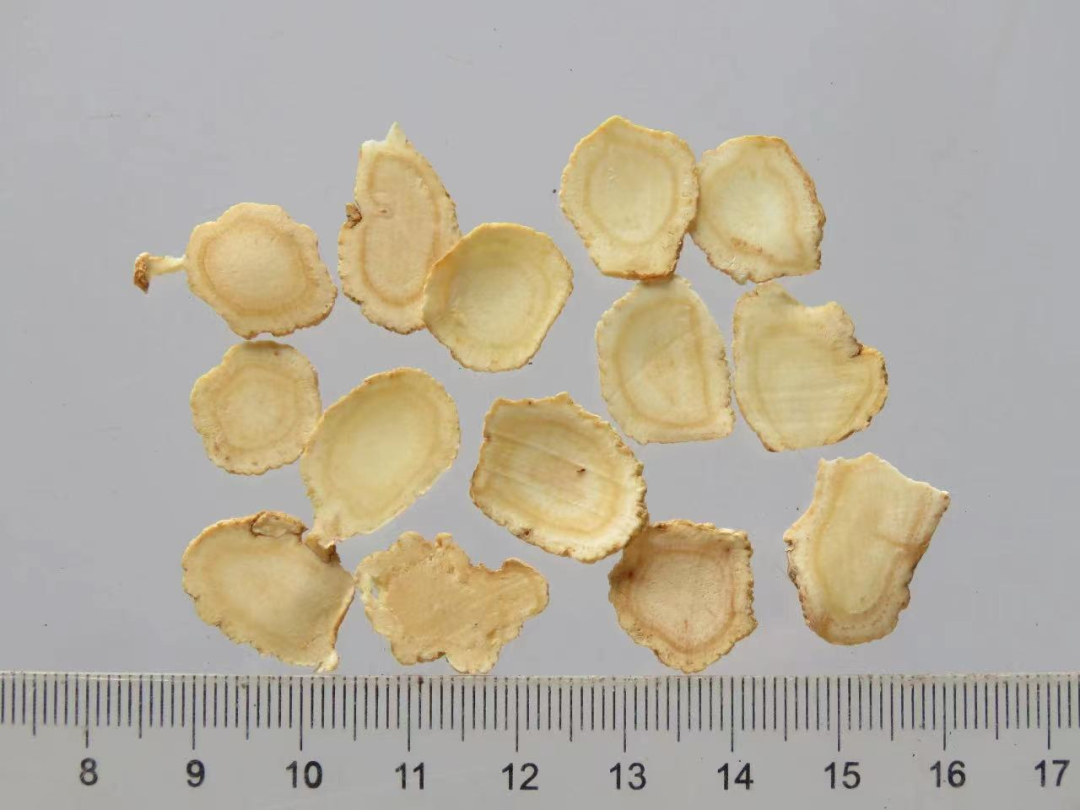
Traditional Chinese medicine holds that both American ginseng and Huang Qi have Qi-tonifying and deficiency-replenishing properties. American ginseng also nourishes the myocardium and enhances cardiac function, making Huang Qi and American ginseng tea an excellent adjunctive treatment for myocarditis.
American ginseng and Huang Qi complement each other; regular consumption can enhance immune function, lower blood pressure, and provide excellent regulation for patients with hypertension and cardiovascular diseases.
Usage:3 grams each of American ginseng and Huang Qi, steeped in 300 milliliters of water to make a health tea, steep for 10 minutes before drinking, and water can be added until the flavor is mild.
What to Do If Huang Qi Causes Heat Symptoms?
Many people experience heat symptoms after consuming Huang Qi. Generally, this occurs due to excessive supplementation; Huang Qi is potent in tonifying Qi, so it must be moderated. Typically, pairing Huang Qi with Dang Gui or Zhi Mu can help mitigate heat symptoms.
Since Huang Qi is warm in nature, consuming too much can lead to heat symptoms; pairing it with cool herbs like American ginseng can help balance its effects.■
